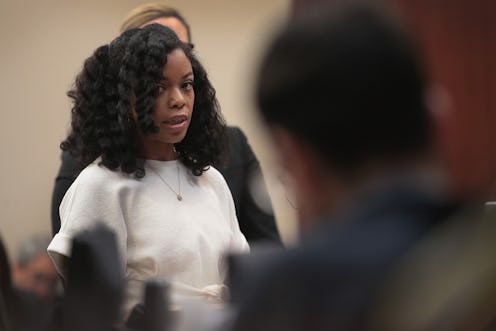News
Larry Nassar Hated Listening To The Women He Abused. Every Predator Should Have To.

The most excruciating part of Larry Nassar's sex abuse sentencing, according to Larry Nassar? When the women who said they had been abused by him got to speak. For almost a full week, the now-notorious "monster doctor" was forced to sit silently as more than 150 women and girls addressed him directly. "I'm very concerned about my ability to be able to face witnesses the next four days mentally," Nassar had informed Judge Rosemarie Aquilina via letter prior to the experience.
Encouraging women to "leave your pain here," Aquilina had invited any person who said Nassar abused them, or was close to somebody who did, to take the floor and address Nassar directly — more than 150 people took her up on the offer.
"Little girls don't stay little forever," said one, Kyle Stephens, who said Nassar began abusing her at 6 years old. "They grow into strong women that return to destroy your world."
It's important to note that Aquilina oversaw a sentencing hearing, and not a trial (offering survivors an open-ended platform during the course of a trial would be seen as prejudicial against the accused). By allowing survivors and their closest friends and family the chance to have the last word, however, Aquilina did more than just sentence a monster. She gave survivors back their agency and encouraged the public to pay attention to their stories, rather than to the convicted serial sexual predator in the courtroom.
When he learned what Aquilina had in store for him, Nassar was angry. "She wants me to sit in the witness box next to her for all four days, so all the media cameras will be directed towards her," he ranted in his letter, which Aquilina later read out to the court.
This proved incorrect. Relatively little attention was given to Aquilina until the sentencing itself — instead, as the judge had anticipated, the "media cameras" turned towards the survivors.
"This is not my shame anymore. It's yours," Helena Weick told Nassar. Aly Raisman addressed him, too:
I will not rest until every last trace of your influence on this sport has been destroyed like the cancer it is.
(Following the sentencing, Aquilina told press that she would decline media requests unless a survivor was also interviewed.)
Throughout the sentencing hearing, all the way up until her final statement, Aquilina allowed the women who said Nassar abused them to take center stage, largely speaking only in support of them.
"The military has not yet come up with fiber as strong as you," she told Bailey Lorencen. "Go out and do your magnificent things," she told another survivor, according to The New York Times.
With quiet deliberation, Aquilina turned what could have been yet another traumatic experience for these women into an empowering one; this could be described as a form of restorative justice, a holistic, individual-based approach to the justice system.
"Restorative justice is about the idea that because crime hurts, justice should heal," writes criminologist John Braithwaite in his book The Good Society. In restorative justice, victims take an active role in the justice process, often speaking directly and sometimes even forgiving the criminals involved.
In addition to helping the women who said Nassar abused them process what had happened, Aquilina's decision made sexual assault survivors the face of the case, rather than Nassar himself. With the world's press trained on Nassar's sentencing, Aquilina forced coverage of the case to focus on the survivors, not the abuser. Too often, the men and women (let's be real, mostly men) who commit large-scale and deeply affecting crimes become the "face" of the crime — Rev. Joseph E. Birmingham, Jerry Sandusky, Bill Cosby, Harvey Weinstein.
Not this time, Aquilina seemed to signal. This time, the women who were most affected by Nassar's crimes — the Olympians, the less famous gymnasts, the everyday women who came to him for treatment — would speak on their own behalf, rather than let media commentators, jurors, experts, and even Nassar speak for them.
Aquilina's decision comes at a watershed moment for sexual abuse and harassment, thanks to #MeToo and other social movements; it also comes two months before Bill Cosby is set to be retried for sexual assault.
In that case, prosecutors are pushing for Judge Steven O'Neill to allow 19 women who say that Cosby assaulted them to testify. In Cosby's last trial, however, O'Neill refused to allow more than one women to go public with her account of assault at the hands of Cosby, who prosecutors say exhibited a wide-ranging pattern of sexual abuse over decades. Without those other women's voices, the trial became a case of "he said, she said," according to some of its jurors, and Cosby ultimately walked free.
Yes, it is difficult to imagine myriad women in a trial setting being allowed to address and challenge the man they say abused them. But Aquilina's decision should have wide-ranging implications for sentencing hearings at the very least. Once an individual is found guilty of sex crimes and expects to face life in prison — whether it's Sandusky or Nassar, who were convicted, or Cosby or Weinstein, who have not been and may never be — then inviting those affected by the crimes to testify harms no one, and may be a useful tool for those who survived abuse.
This perspective is reflective of the author's opinion, and is part of a larger, feminist discourse.